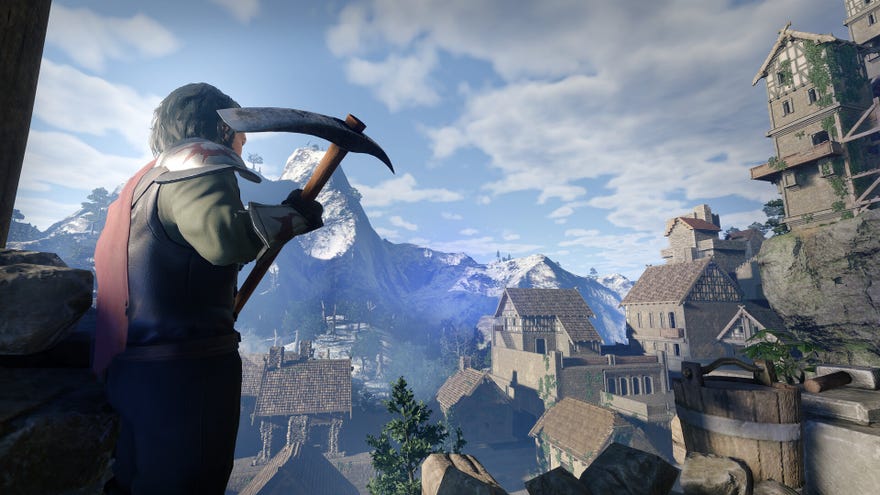Enshrouded early access review: the best building system in the survival genre
Peel back the Shroud and there's a solid foundation here
I realised several hours into my Enshrouded playthrough that I have an unspoken internal checklist for what makes a great open-world survival crafting game. Great building, a sense of scale, a beautiful atmosphere, and the ability to die in extremely stupid ways. In Minecraft, it's digging straight down into lava. In Valheim, it's getting crushed by the very tree you'd just chopped down. And after dying for the third time by trying to climb a slightly-too-steep hill, slipping down and building enough momentum to send me careening off the cliff to my death, I realised that Enshrouded, too, ticks all the boxes for maybe one day being listed among the titans of the genre.
One paragraph in, and I've already compared Enshrouded to Valheim. You'll see that quite a bit throughout this review, and for good reason. Enshrouded has come the closest for me to recapturing that feeling of when the world collectively discovered Valheim for the first time. But that's both an accolade and a reservation. Because it's not quite there... yet.
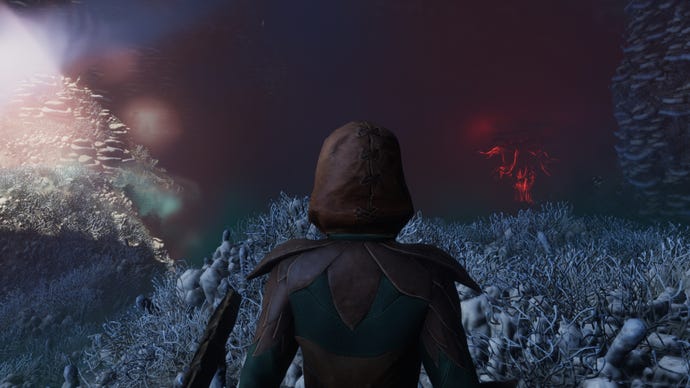
Enshrouded is a third-person survival crafting game set in a massive, prebuilt fantasy world called Embervale. Its unique selling point and namesake is the Shroud - a magical fog, inhabited by fell enemies. The Shroud covers huge swathes of the map, like rivers and lakes in other fantasy worlds. Whenever you enter it, a timer starts to count down at the top of your screen. If the timer runs out, you die.
As a main point of differentiation from others in the genre, I'll admit it's not nearly as exciting as, say, playing as a sunbeam-dodging vampire, or exploring an entirely underwater planet. In fact, the times I spent in the Shroud were probably the least fun I had in Enshrouded. Embervale is a sprawling, painstakingly crafted world, densely populated with unique little points of interest like ruins, villages, wells, and ravines. It can be truly gorgeous at times. But the moment I step into the Shroud, all I see is fog. Low visibility, an oppressive atmosphere, and constant time pressure aren't why I play these games (don't ask me how the hell Subnautica manages it, it's witchcraft as far as I'm concerned), and while I do appreciate how the Shroud timer makes you plan ahead and prepare for excursions into the fog, it was always less enjoyable than going on similar adventures above the Shroud.
But while the Shroud is the key selling point of Enshrouded, it's not the reason to play it. I realised early on that if you scooped up every last bit of the Shroud from the map and completely removed it from the game, there's still enough going on to make Enshrouded feel unique. It's a bit of an odd one. I almost wish the game didn't make such a big deal of the Shroud, because it feels like it's putting its worst foot forward. By keeping my head above the fog, I slowly fell in love with the rest of Enshrouded.
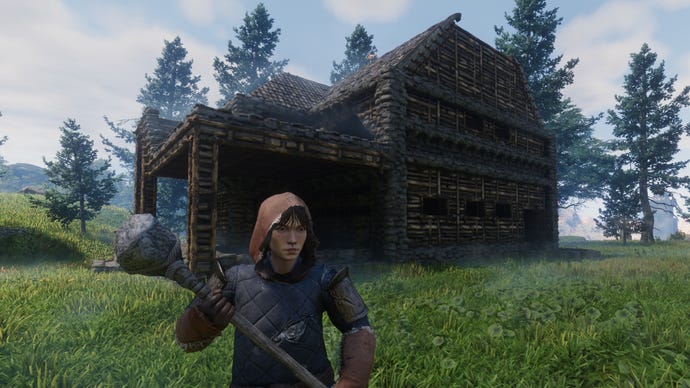
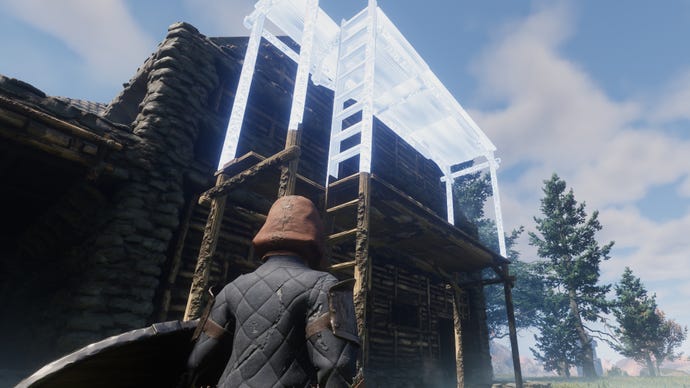
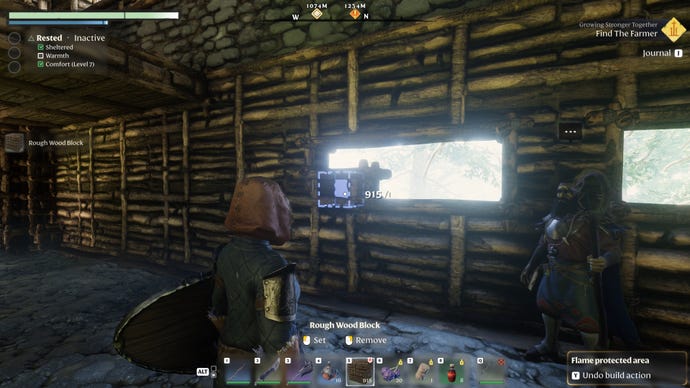
Let's talk about the building, because that's where Enshrouded shines brightest. Keen Games have built upon the foundations of their previous voxel venture, Portal Knights, and delivered probably the best building system I've ever come across in a survival crafting game. By building a Flame Altar out of stone, you can designate an area safe for building. After that, you can craft a Construction Hammer, and with the Hammer in your hand, you can open up Enshrouded's expansive voxel building mode. Here you can use various premade shapes to quickly plop down walls, floors, stairs, and roof parts of all types, but all those shapes are malleable. After placing down a wall, I can sculpt out a window area, or add more blocks for an extra decorative touch. The premade building parts are essentially just shortcuts, so you don't have to place everything down a block at a time a la Minecraft. It's a very powerful and easy to use building system.
I particularly love the game's clever use of the mouse wheel to select your desired building parts and materials. Scroll the mouse wheel on its own and it selects the building shape in your building hotbar. But hold ALT and scroll, and you can switch between different hotbars themselves, each with their own types of building shapes. And for any of those shapes, you can hold CTRL and scroll to change the building material from stone to wood to metal and so on. It's wonderfully intuitive, and I'll miss it dearly when I move onto any other survival game.
The building materials, too, are lovely; very rustic-looking, which is right up my alley. I love how they subtly change their look once placed, based on the other blocks around them. And in an inspired move, several of these blocks require you to explore the world and visit particular points of interest to unlock their recipes. Whenever I got a bit burnt out with exploring and fighting in the Shroud, I'd turn to building. And eventually, the promise of more building blocks would get me right back into exploring again.
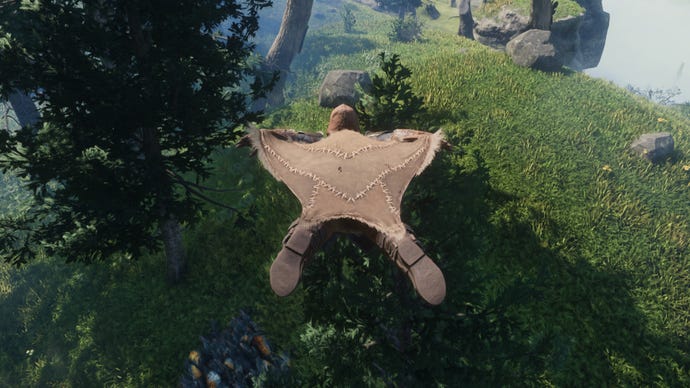
At first my adventures were dominated by quests, which does a good job of orienting new players. Over the first few hours, I was sent on expeditions to gather materials to craft two important traversal items: the Grappling Hook and the Glider. They're exactly what you'd expect, and they do make moving about a lot more fun, which is very much necessary in a game with such a large map and no mounts to ride (currently).
I was also sent to find other survivors who, like me, were waiting to be awakened from their slumber inside large metal pots (read: Embervale's fantasy take on cryogenic freezing booths). I quickly found and awoke a Blacksmith, who later sent me off in the direction of a sleeping Hunter, who in turn told me to awaken a Farmer, and so on. There are five of these NPC characters to unlock in total, and you'll unlock them all fairly early on in your playthrough. They're little more than glorified workbenches that offer different kinds of recipes, and they don't move from where you place them within your home - they're just sort of there, staring at you unnervingly while you go about your work until you need them.
After those first few quests, a lot of your time spent exploring the massive world of Embervale boils down to fighting creatures and bandits, and looting them for better equipment. The combat system is similar to Valheim, and best described as "clunky soulslike" combat. There's dodging, and parrying, and all that good stuff. Credit to it, in Enshrouded you do have to pay attention to enemy attack patterns and adapt to them, or you'll quickly be punished. It's not fantastic, but it still offers more than most combat systems in the survival crafting genre, which has always lagged behind the rest of the games world when it comes to tight-feeling combat.
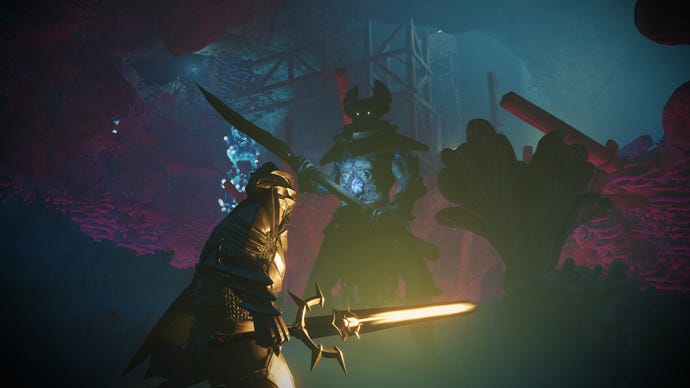
Fights are a bit of a mixed bag though, because while there are a lot of different weapons, they all feel insipid and uninspired. Swords and axes may deal differing amounts of cutting and blunt damage, but at heart they're just very slightly different takes on the same vanilla flavour of melee combat. Same with the variety of two-handed maces and guillotine axes on offer. The bows and staves feel pretty cool to use, I'll admit - but even they suffer from the same issue, where I end up picking the one with slightly better stats because none of them have any flair or character.
A lot of Enshrouded is a mixed bag, in truth. For every lovely quality of life feature that I wish other survival crafting games would copy, there's a glaring omission that makes me throw up my hands and exclaim, "How can you not get this right in 2024?!", and I experienced a lot of mental whiplash. You can pin a recipe on screen to keep track of ingredients; it does not automatically un-pin when you've crafted the item, so you have to do it manually. Equipped items of clothing don't take up space in your inventory; you cannot split item stacks in your inventory apart from exactly in half, which is a problem if you only want two items out of a stack of 50.
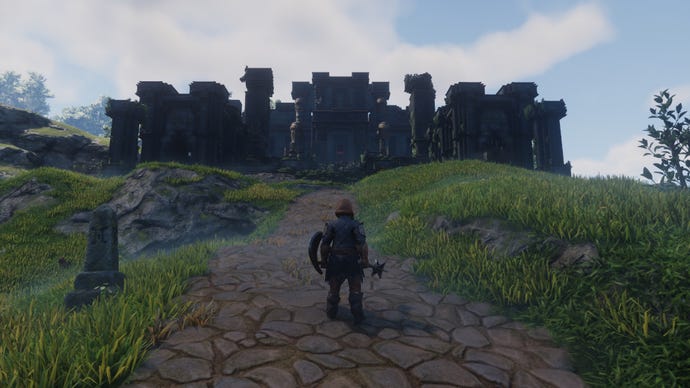
I do feel like I've probably missed something in not playing Enshrouded multiplayer during my time so far with the game. It's always much easier to forgive little foibles and frustrations when you're having fun with friends. It's a bit of a lonely affair, playing Enshrouded in singleplayer. At times, that's quite comforting. Embervale is a quiet safe space for you to build and explore as you see fit. Other times, it felt a little melancholy. I think it might be more pronounced when you're sharing a home with five static NPCs who might as well be crafting benches, for all the character they've been given.
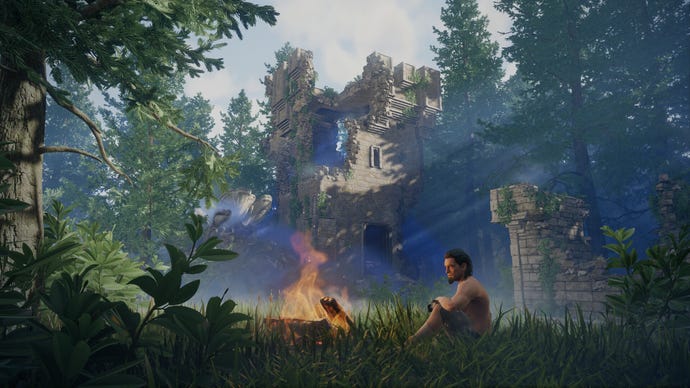
The music in Enshrouded is... well, it's very dreary. It's nice enough, but it all feels a bit too sombre to be playing all the time. I wish they'd add some tracks with a bit more life and joy in them as well. Image credit: Keen Games
I also have to speak briefly on the technical difficulties I encountered in Enshrouded. It's through the lens of early access, of course, but I've found it hard to forgive for erasing an hour's worth of progress. Nor was it easy to contain my frustration when I spent two hours trying to reclaim my belongings, but couldn't because the game kept crashing. Crashing and saving issues aside, the game runs decently well on my (admittedly very beefy) RTX 4080, reaching around 70 FPS on the highest settings and 120 FPS on the lowest. I wouldn't call it a very well optimised game from those figures, though, and there's a particular problem around sunset and sunrise where the FPS tanks down to 20 FPS without fail. Admittedly I struggle to remember the last early access open-world survival crafting game that didn't have day one performance issues, so I'm willing to cut it some slack there. But others with lower-spec PCs may not have as much slack to cut.
If you can get on with Enshrouded despite its early access quirks and underwhelming premise, you'll find a rock solid foundation for what I really believe could one day be one of the most popular and well-thought-of survival crafting games out there. The building is absolutely exquisite, and the main reason I'll continue playing. The combat is sound, the world is evocative, beautiful, and thick with surprises. It is, as I say, the closest anything has got to recapturing the feeling of playing Valheim for the first time, and while my 40-odd hours with Enshrouded has left me more than anything wistfully wanting to go back to Valheim itself, I'm sure there will be times when I say to myself, "I wish it did this thing like Enshrouded does it."
This review is based on a review build of the game provided by publishers Keen Games.
